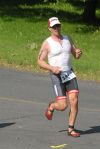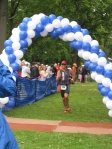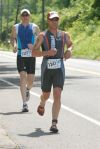 This summer I stumbled across a long lost friend, a partner, a tool. It had been many years since we'd last raced together and sadly I didn't even know it.
This summer I stumbled across a long lost friend, a partner, a tool. It had been many years since we'd last raced together and sadly I didn't even know it.Years ago when I first started running I quickly established myself as a front runner. I always raced better during track and cross country season then I did on my own during the summer, but either way I was a threat. During the summer I always placed top 3 in my age group and during cross country and track season if awards were given, I was usually one of the recipients.
It didn't take long for me to figure out though that I ran better with a team
than I did when running solo. And the more the team needed me, the better I
did.
Another thing I quickly learned was that the worse I felt, the better I did.
Heaven help the opponents if on a day I didn't feel well or was hurt that the
team really needed me to step it up because I was guaranteed to blast one out.
I was the go to guy on race day and the more my team needed, the more I gave.
I went on to run college cross country for a couple of years after high school.
I started out my first season with a big bang, winning my first race. My team
needed me and I came through. We won the meet, barely, and against the one
school's second team, but it was our first victory. And our last...
The following week in a much bigger meet pulled off a top 10 finish to lead my
team to dead last. The next week I dropped to top 20 and we again finished dead
last. My finish place declined steadily thereafter.
My second, and final, college season didn't fare any better. I never placed and
until the final meet of year we placed dead last. That last meet we achieved
our teams lofty goal of beating someone, anyone, and finished second to last.
My team didn’t really need me and I was fine with just running, but not
actually racing.
I continued running and racing for many years after that. Often doing well in
smaller local races and always finishing in a respectable time, but never quite
getting back on top of things. A few years ago I added triathlons to my race
schedule with similar results. I was finishing run and tri in top 30% but not
really being competitive. I was running hard, training hard, but falling short.
I was good, but just not good enough.
Last season a friend, much younger than me got into triathlons and I sort of
became his mentor. Shortly thereafter a coworker did the same and we became
friends as well and now I had two 'mentees'. They both showed promise and did
well in their first seasons. Both were faster than me for very short distances,
but lacked strength and experience to challenge me so far in an actual race.
At the beginning of the season the youngest and newest of my mentees, Jason, convinced
me and the other mentee, Doug, to do a sprint tri to kick off the season. I
reluctantly signed up. I've known for years my strength is in distance, and
avoid most shorter races, but decided it would be fun to go 'head to head' with
them.
Race day came and I found myself starting a couple of waves in front of both of
them. Part of me had planned to take it easy and have fun, but once I knew they
would be behind me trying to catch that all changed. I was all business by race
start and pushed myself through water with everything I had. As I exited the
water I pounded across the grass to transition and I was quickly out on the
bike. Once I got on the road I just hammered away on the pedals and it seemed
like I was back in transition in no time. I flew out of T2 and speed around the
run course and before I knew it I was across the finish.
 I knew that I had a good race and thought that a possible age group award might
I knew that I had a good race and thought that a possible age group award mightbe coming. What surprised me was that I finished 3rd overall and managed a 6:28
pace on the run. I hadn't run that fast in years for any distance, much less at the end of a triathlon. I was thrilled, evidently I was finally doing something right, because I was getting faster again.
The following week I had two more tri's, an olympic on Saturday and a 1/2 iron on Sunday. I went into the season with high hopes that I was going to have breakout races. Saturday I PR'd but not by as much as I had expected and Sundays race was solid, but nothing to get excited about.
I was puzzled as to what happened. Yes they were longer races, but some of my
new speed should still have carried over. I pondered this for a couple of weeks
while I tried tweaking my training in an attempt to figure out why I had done
so well one week and then just ok the next.
About two weeks later I read a blog post written by a friend, Ann B, about underachieving. Something clicked on and I suddenly had a neon bulb shining on things. In high school and college I stepped up my game and pushed with all I had to help the team. Since then it was just for me and that extra push, just faded away. I still ran hard but not as hard. I pushed through pain, fatigue, cramps and more, but I hadn't really been pushing myself to the breaking point. I was willing to go there for the team, but had ceased doing it for myself.
Until the sprint triathlon that is. Something about being beaten by younger and
faster friends brought it back out and I pushed to the red zone and slightly
beyond. I have more experience than either of my friends and currently I'm a
much stronger runner and cyclist, but I know they are faster than me. They may
not be able to hold the speed for long but I really thought they had enough to
beat me at a sprint and I just wasn't ready to let that happen. As a result I
pushed through the pain, hit a point where I thought I was all out and pushed
beyond it and had a break out race. The following week I hit that same point,
but didn't try to push through, I thought I was at the limit, but wasn't.
 The rest of the summer I had hits and misses with my performances. I pushed
The rest of the summer I had hits and misses with my performances. I pushedthrough that extra barrier several times, but not consistently and didn't
always hold it, but I was relearning. My final Tri of the year, a couple of
weeks ago, I found that push again on the run and it carried me to a 5 minute
run PR.
Despite finding that extra push and now knowing it is there, I still can't tap
into it regularly. I can still run/ride/swim long and hard and push through the
comfort zone and well into the pain, but I'm not finding that extra push that
takes me into the red zone as often as I would like. Maybe part of me realizes
the danger of it more than I did when I was younger. It is a point beyond pain
where you know you are teetering on the edge of crash and burn and possible
injury, but you ride it as long as a hard as you can. Experience helps keep you
riding that razors edge without plummeting over it, but it also takes
experience and a lack of fear or care about what may happen if you push too
hard to get there.
Pushing to the edge helped me tremendously back in high school, but it was also my downfall back then too. It took me to many wins and high placings in many races, but I went over it several times as well. I lost half of my sophomore cross country season with
injury from pushing over the edge, and 2/3 of the track season that year for another injury. Junior year I managed to walk the edge without a slip, but my senior year I pushed so far over I fell into the abyss. The summer leading into my senior year I pushed it to the edge and held it. I held it through most of the season. I was on a mission. Our team had a goal of placing at the state championships and possible getting the school’s first ever win there.
That senior season I PR’d week after week, and we won meet after meet. There was only one meet we didn’t win during the regular season. We then went on to win our conference, sectional championship, regional championship, and the school’s first ever semi-state
championship. Unfortunately, I rode that edge too long and at regionals I felt myself sliding over, and by semi-state I went into a free fall. I still raced well in those races, but I knew I was in trouble. The legs were pure rubber and I couldn’t get them back. At the state championship, not only did we not win, and not place, we were 15th out 16 and I was one of the last 10 finishers.
Yeah, it takes a team to win, but an individual can bring them down. After two years of being one of the main team leaders, I had nothing in me. Unfortunately, my team mates instead of passing me as they should, most of them ended up grouped with me. A mental block made it hard for them to pass the guy that had been leading them. I yelled and
encouraged and finally with ¾ of a mile to go literally grabbed one of them and
shoved him in front of me and pushed him away. Finally trance broke and the all
took off and left me. It was over 2 months before I got my legs back and could
run with any speed or strength. The loss that day was not purely mine, and I
know it now, but it was a tough price for a great season.
 Pushing yourself to the edge is what defines a true competitor. There is a big risk with each race, but a potential big payoff as well. My mind set has difficulty accepting that pro athlete that will drop out of a race, just because they are not among the leaders, but part of me knows that they do it so they aren’t risking that fall over the edge for nothing and that they will be ready for the next challenge.
Pushing yourself to the edge is what defines a true competitor. There is a big risk with each race, but a potential big payoff as well. My mind set has difficulty accepting that pro athlete that will drop out of a race, just because they are not among the leaders, but part of me knows that they do it so they aren’t risking that fall over the edge for nothing and that they will be ready for the next challenge.For me the difference between a jogger and a runner is motive and how much they push, not the pace they actually run. Joggers run up to the edge of comfort and no further. Runners push into the pain and go with it. A competitor will push a bit farther and risk injury or DNF to try and get the win.
I used to know that razors edge well and I miss it. I've raced very well over the years despite losing it, but I'm getting hungry for more. Thanks to Jason and Doug pushing me
and Ann for switching on the light, I think I'm on my way to regaining it. I will never win anymore championships, but this old body still has some big races left in it and I mean to find them. I’m ready to take the risk again.
